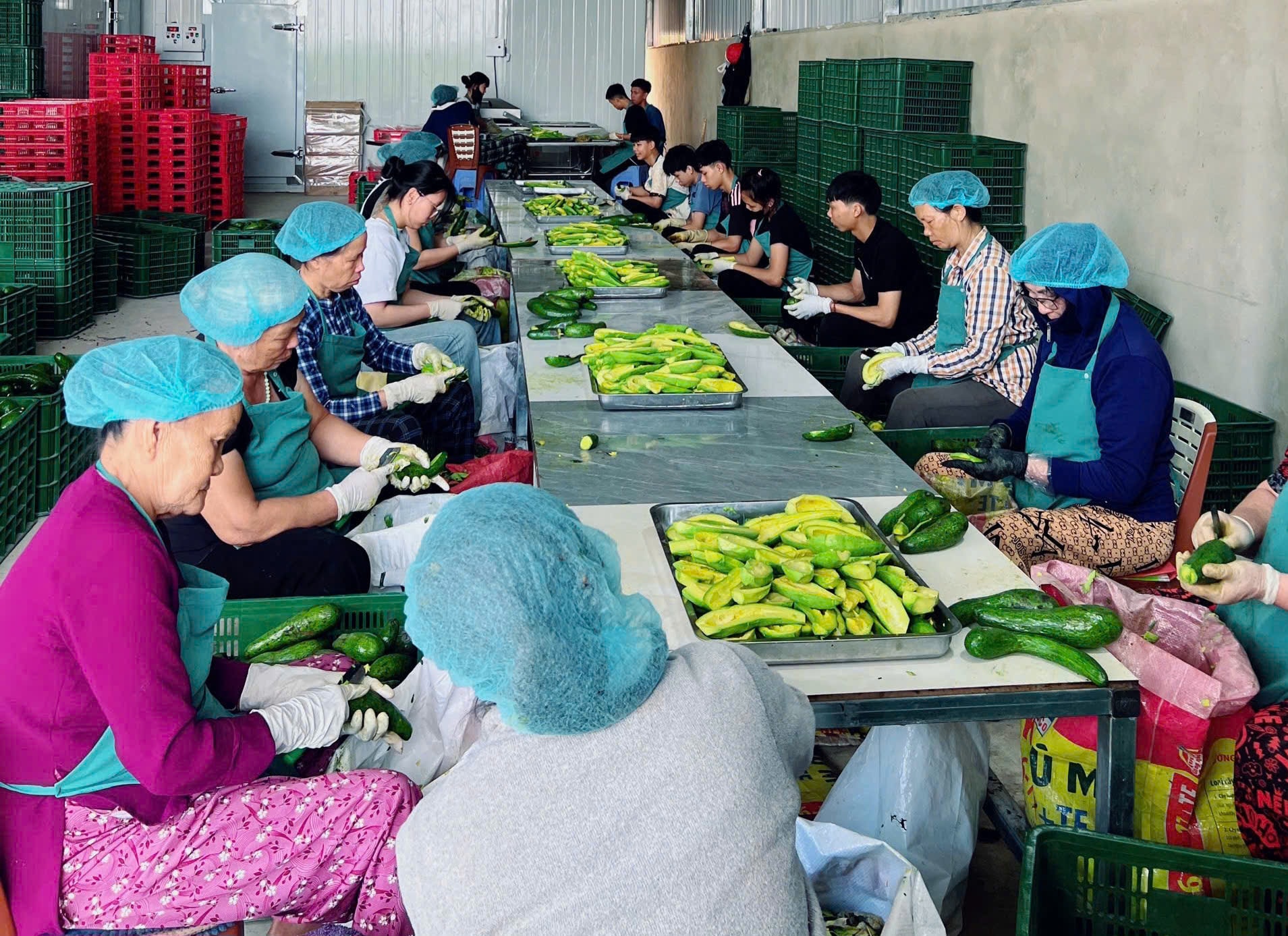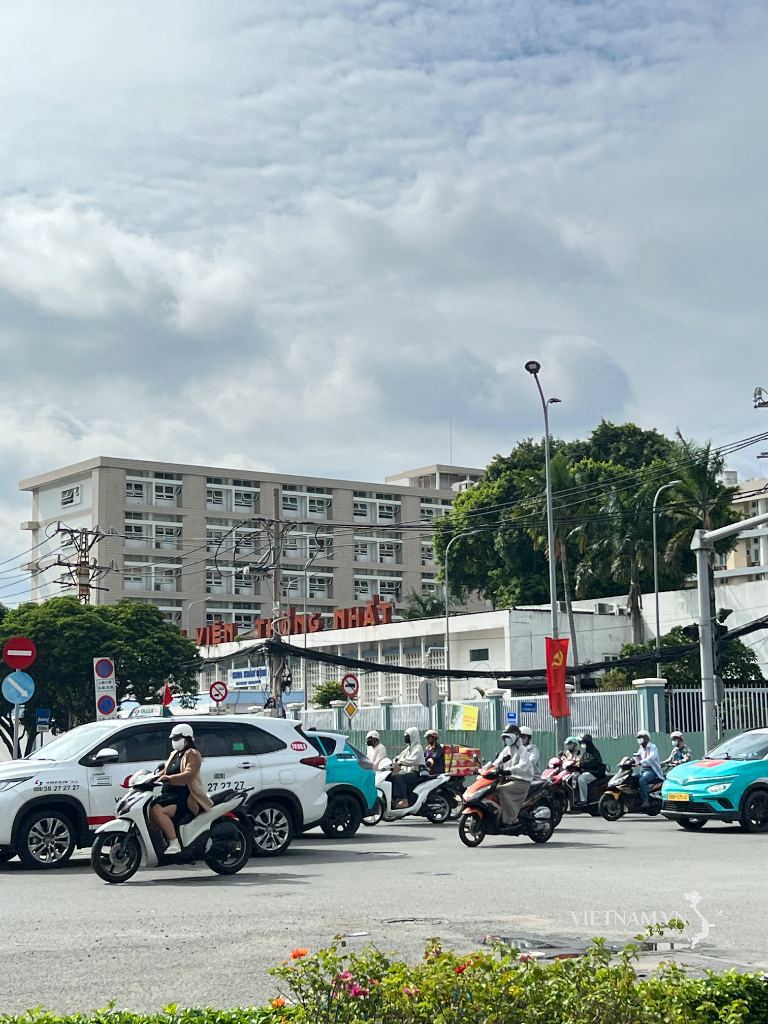.jpg)
A new direction for avocado cultivation.
While many farmers are turning their backs on avocado trees due to plummeting prices, Nguyen Kien Phuong in Quang Phu commune (Lam Dong province) has found his own path with avocado cultivation. On over 10 hectares of land, Phuong grows foreign avocado varieties such as Hass, Reed, and Pinkerton – varieties that dominate a large share of the global market.
He recounted that he was initially worried because the imported avocado variety was difficult to care for, expensive, and required advanced techniques. But thanks to diligently learning, investing in a drip irrigation system, and cultivating according to VietGAP standards, his avocado orchard gradually stabilized. “The imported avocado variety ripens throughout the year, has thick skin, is less prone to spoilage, and always fetches a good price. For many years now, a company in Gia Lai has been guaranteeing the purchase, so I don't have to worry about sales. As long as I maintain good quality, the price remains stable,” Mr. Phuong said, his eyes shining.
Besides planting avocados, Mr. Phuong also joined local farmers in establishing the Nam Kar Volcanic Avocado Cooperative, linking its brand with the UNESCO Dak Nong Global Geopark. The cooperative's avocados have been recognized as a 4-star OCOP product – a significant milestone that helps the product reach a wider market. "We're no longer chasing trends; we're farming like we're producing real goods. Each avocado tree has a planting area code and is carefully monitored," he said.
While Mr. Phuong chose the path of "doing things meticulously to survive," in Phuc Tho commune, Lam Ha district, Ms. Nguyen Thi Trang chose the path of "doing things differently to survive." Having been involved with avocado cultivation for many years, Ms. Trang understands the hardships of growers when prices drop, traders pressure them, and ripe avocados fall from the trees in the orchard without being sold.

Driven by this concern, she decided to invest nearly 2 billion VND to build a processing and freezing facility for avocados right in the avocado growing area, with a capacity of about 60 tons. "At first, many people said I was reckless, but if everyone just sat and waited for traders, how could avocado trees survive?" she laughed.
Her freezing facility is currently operating smoothly. Avocados are selected, cleaned, sliced, quick-frozen, and then refrigerated, preserving their natural flavor and quality. “The fresh avocado market fluctuates, which can be discouraging for growers. Freezing is a way to extend the shelf life of avocados, giving farmers time to breathe,” Ms. Trang shared. “Processed and frozen avocados are not only for domestic sale but can also be used as raw materials for export, cosmetics, or beverages. The avocado trees remain healthy, as long as you know how to do it correctly,” she confidently stated.
By 2030, Lam Dong province aims to increase the percentage of avocados processed to 25-30%, focusing on high-value products such as avocado oil, frozen avocados, and dried avocados. The province will promote the standardization of growing areas, the application of VietGAP, GlobalGAP, organic farming, and electronic traceability – mandatory conditions for expanding exports.
Growing avocados according to microclimates opens up access to the market.
According to the plan for 2030, Lam Dong province aims to stabilize the avocado cultivation area at approximately 17,500 hectares. The agricultural sector has identified key microclimates to develop suitable avocado varieties. In cool climates (altitudes above 1,000 m, temperatures 12-28°C) such as Di Linh, Bao Lam, Dak Glong, and Dak Song, the province prioritizes planting Hass and Pinkerton varieties, which have rough skin, creamy flesh, and high quality, suitable for export.
Lower-lying areas such as Lam Ha, Duc Trong, Krong No, and Dak Mil focus on avocado varieties like 034, Booth, Hass, and Mexico, which are well-adapted to the climate conditions and ensure stable yields, serving the domestic market year-round.
In addition, the province is orienting towards standardizing growing areas according to VietGAP, GlobalGAP, and organic standards, linked with electronic traceability to meet the requirements of domestic and international markets.
Lam Dong province encourages the development of off-season avocado cultivation in suitable areas to reduce pressure during the peak season. Avocado trees are also encouraged to be intercropped in industrial plantations, helping to utilize land and increase income for farmers.
Notably, the province is collaborating with a New Zealand partner through SAM Agritech to expand the cultivation of Hass rice in suitable sub-climatic regions – aiming for products that meet export standards for high-end markets.
To overcome bottlenecks in preservation and logistics – considered the "choke point" of the avocado industry today – Lam Dong province is implementing a series of comprehensive solutions. The focus is on encouraging the socialization of investment in cold storage and specialized transport vehicles, supporting businesses in accessing preferential loan sources, and transferring post-harvest preservation technology.
Furthermore, the agricultural sector is orienting towards cooperation with businesses applying modern technology to extend the shelf life of avocados from the current 3-7 days to 30-40 days while maintaining fruit quality. Developing cold storage, processing, and packaging systems that meet international standards will not only reduce losses by 20-30% but also create a foundation for export and further processing, contributing to building a more sustainable avocado value chain.
According to Mr. Ha Ngoc Chien, Head of the Department of Crop Production and Plant Protection, the biggest obstacles for avocado cultivation today are logistics, processing, and quality standards. Once these three points are overcome, Lam Dong avocados can completely enter the global market with a new position.
Mr. Chien stated that in the coming period, the province will stabilize the planted area, focus on improving quality and investing in preservation technology, while supporting businesses and cooperatives in building a supply chain from production to processing to consumption. In addition, the locality is promoting the registration of geographical indication for avocado variety 034 and building the brand "Lam Dong Avocado," aiming for an image of a green, safe, and export-standard product.
Lam Dong province is focusing on standardizing growing areas, selecting suitable varieties, promoting deep processing, and expanding consumption connections, bringing avocado cultivation back onto a sustainable development path. The responsibility for avocado cultivation today rests not only with farmers, but is also a shared challenge for the entire agricultural sector – from planning, varieties, and techniques to markets.
When planning is aligned with market demand, production goes hand in hand with technology, and growers are placed in the right position within the value chain, avocado cultivation will break free from the vicious cycle of "bumper harvest, low prices." Avocado will then no longer be a fleeting trend, but a crop that provides stable income and sustainable livelihoods for farmers. Furthermore, avocados will become a distinctive agricultural brand of Lam Dong province.
Lam Dong province has approximately 84 avocado processing facilities, including 4 large enterprises and 80 small-scale establishments, with a capacity of 15,000 - 18,000 tons per year, equivalent to only 15% of the total production.
Source: https://baolamdong.vn/tim-huong-di-ben-vung-400565.html





![[Photo] The General Secretary presents the title of Hero of the People's Armed Forces to the Navy.](https://vphoto.vietnam.vn/thumb/1200x675/vietnam/resource/IMAGE/2026/02/28/1772251730336_vna-potal-tong-bi-thu-to-lam-du-va-trao-danh-hieu-anh-hung-llvt-nhan-dan-cho-quan-chung-hai-quan-8612073-jpg.webp)









































































































Comment (0)